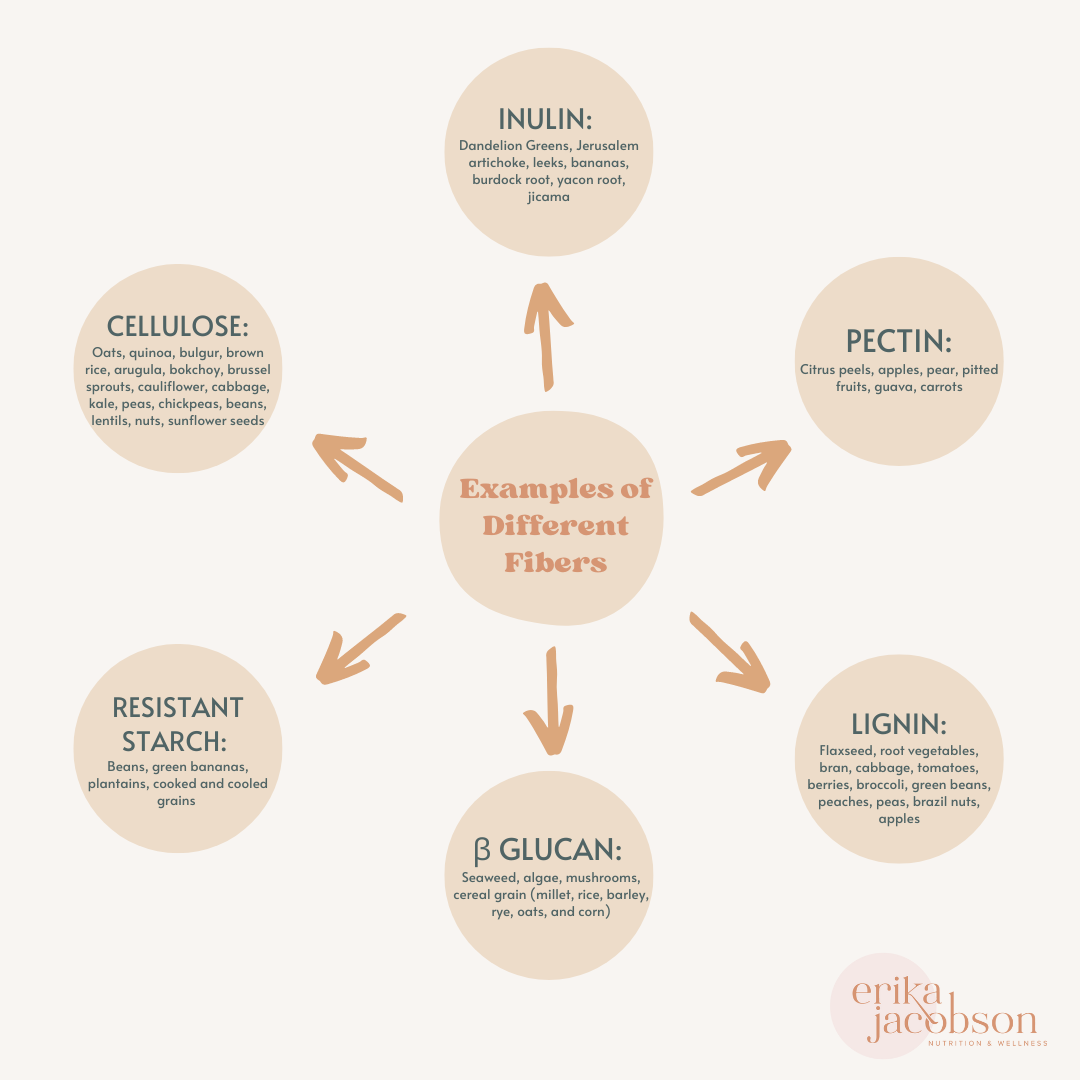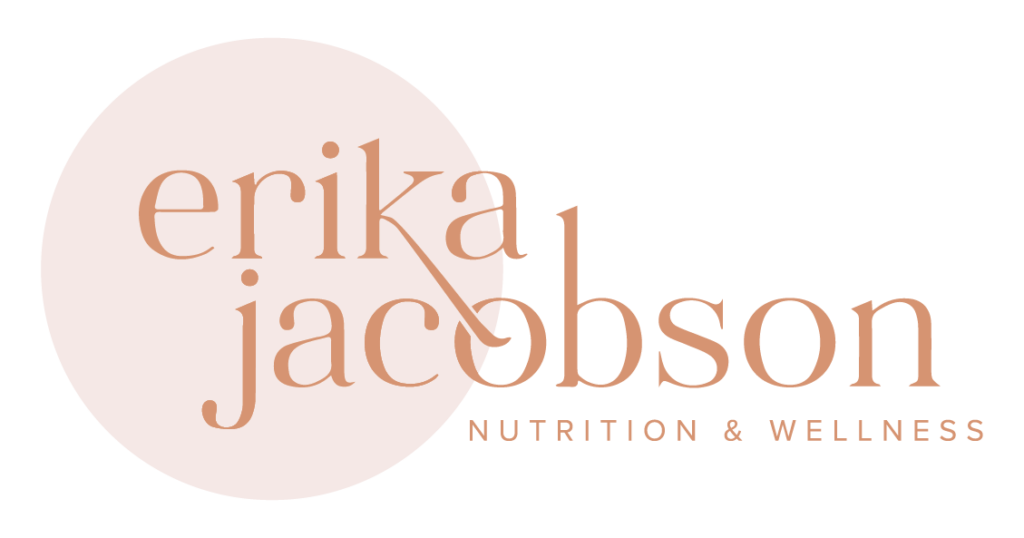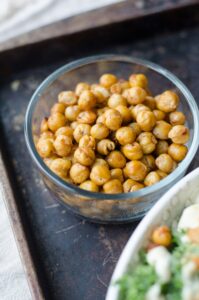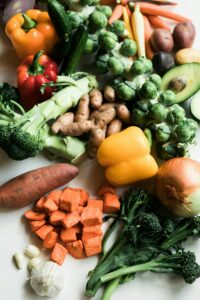Did you know that a balanced microbiome relies on the diversity of fibers in your diet?
Studies show a total intake of 25 to 35 grams of fiber per day is recommended to support overall health (1). However, it’s not just about getting enough fiber, but also about mixing up the types of fiber and plant foods you are eating to promote optimal gut health and healthy gut bacteria.

In this blog post, we’ll explore why fiber diversity is so important for achieving excellent gut health and how to incorporate more fibers into your daily routine.
Research from the American Gut Project reveals that people who eat 30 different plant foods every week have a more diverse microbiome – that means having more of the good bacteria that live in our digestive system (1). And that’s a big deal!
Fiber acts as fuel for the good gut bacteria, and different plant foods have unique fibers that feed different types of gut bacteria. Plus, the polyphenols found in plant foods also help nourish our bacteria! So, eating a wide range of plant foods is a vital piece of the puzzle in keeping our gut microbiome happy and healthy.
Having a diverse microbiome has a ton of benefits for your body. It’s especially important for your immune health since your immune system is mostly located in your digestive system. Plus, microbes provide essential nutrients, help with digestion, reduce inflammation, and even affect your metabolism.
In fact, a whopping 99% of your metabolism is dependent on the microbes in your body. So, the more diverse your microbiome, the better it is for your metabolism (2).
So next time you think about fiber, remember that it’s not just about the grams – it’s about consuming a diverse and healthy variety of plant foods for overall wellness.
Lack of diversity is one of the big reasons I am not a fan of elimination diets. While they may temporarily ease symptoms, in the long run, they can actually deplete our good gut bacteria. And that’s bad news for digestion! By depleting the helpful bacteria we need to properly digest food, we end up causing more problems down the line.
So, how can you increase fiber diversity to support healthy gut bacteria?
The key is to aim for 30 different plant foods each week. Remember, plant foods go beyond just fruits and veggies – they also include nuts, seeds, legumes, and whole grains.
To achieve 30 different plant foods, try selecting a few options from each category mentioned below. Even different types of berries contain different fibers so if you ate strawberries and blueberries, that counts as two different plant foods.
Start by assessing your current intake and then gradually increase it. For example, if you currently consume 5 different plant foods per week, why not add two new options to your shopping list for next week? From there, continue to build up your variety!
Non-Starchy Vegetables:
Arugula, Spinach, Watercress, Summer squash, Carrots, Snap peas, Asparagus, Cucumber, Zucchini, Eggplant, Bean Sprouts, Green beans, Bell peppers, Mushrooms, Endive, Fennel, Radishes, Tomatoes, Artichoke, Onions, Garlic, Kale, Brussels sprouts, Bok Choy, Cabbage, Broccoli, Broccoli rabe, Cauliflower, Collard greens, Mustard greens, Swiss chard, Seaweed
Starchy Vegetables:
Butternut Squash, Acorn Squash, Kabocha Squash, Delicata Squash, Beets, Plantains, Sweet Potatoes, White Potatoes, Root Vegetables, Parsnips, Rutabaga, Green peas, Corn
Fruits:
Apples, Blueberries, Raspberries, Strawberries, Grapefruit, Oranges, Lemons, Limes, Peaches, Pears, Kiwi, Pineapple, Pomegranate seeds, Bananas, Grapes
Beans & Legumes:
Lentils, Navy Beans, Black Beans, Kidney Beans, Chickpeas, Bean & Lentil Pastas
Whole Grains:
Rice (white, brown, wild), Quinoa, Teff, Oats, Buckwheat, Amaranth, Whole Wheat Bread
Plant-Based Fats:
Sesame Seeds/Tahini, Avocado, Olives, Almonds, Chia Seeds, Flaxseeds, Hemp seeds, Pumpkin Seeds, Peanuts, Walnuts, Macadamia, Pecans, Brazil Nuts, Cashews, Hazelnuts
I know, the thought of eating 30 different plant foods a week may sound daunting at first but I’ve got some great tips to help you make it easy and sustainable:
- Salad Superstars: Mix it up with different greens like arugula, kale, and spinach, purchase them as a blend to make it super easy!
- Supercharge your breakfast with hemp, chia, and ground flaxseeds. I love adding all three to a mason jar and sprinkling on whatever I can (oats, yogurt, toast, smoothies)!
- Nut Butter Lovers: Experiment with mixed nut butter (try Nuttzo or the one from Trader Joes!)
- Mix it up: Add mixed frozen fruit to a smoothie or mixed frozen or fresh veggies to a stir fry to get multiple plant types in one meal without any extra effort!
Plus, I made a FREE grocery guide that will make increasing fiber diversity easy! Download it to get access to a complete grocery list, tips on how many items to choose from each group every week, and even a sample grocery list to get you started.

So there you have it – fiber is essential for overall health and gut health, but simply focusing on the number of grams won’t cut it! You need to eat a variety of plant-based foods to feed the amazing microbes that live inside your digestive system. Research suggests that the magic number to aim for is 30 plant foods per week. Focusing on plant diversity will not only help with digestive issues but can also help with boosting your overall health.
Ready to nourish your microbiome? Grab my super simple grocery list to effortlessly add more plant-based foods to your diet.
Stuck on an elimination diet that limits the diversity of foods in your diet? If you are looking for an approach that goes beyond food restrictions and helps you heal your gut for good so you can enjoy eating again, book a root cause clarity call with me.
- McDonald, Daniel, et al. “American Gut: An Open Platform for Citizen Science Microbiome Research.” mSystems, vol. 3, no. 3, 2018, https://doi.org/10.1128/msystems.00031-18.
- Lipski, Elizabeth. Digestive Wellness: Strengthen the Immune System and Prevent Disease through Healthy Digestion. McGraw-Hill, 2020.




